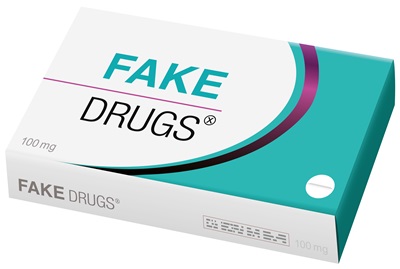Fraud spotlight on fake medicines sold online
Criminals commit crimes involving deception because it is financially worth it for them, such as scams, phishing emails, and even selling fake or unlicensed medicines and healthcare products online. Criminals will continue to commit such crimes so long as people continue to fall for them. This is why it is so important for people to be aware of the risks and dangers, and in turn to spread the word to raise awareness and help to prevent more people falling victim.
‘Counterfeit’, in a nutshell, means to make an unauthorised imitation of something valuable with the intention to deceive individuals into believing that the fake product is the real thing. Counterfeiting is big business, resulting in huge profits for the criminals involved, and which may go on to fund further criminal activity. History shows that people have been involved in counterfeiting for thousands of years, and the practice of counterfeiting money is as old as money itself… and it does come down to the money.
Any adverse consequences of using fake medicines aren’t the concern of criminals or organised crime groups, they’re in it for the money and don’t care about a victim’s welfare. Most of us will probably be aware of, or have even seen, the sale of fake goods such as ‘knock off’ designer clothes, handbags, watches, but may be less aware of the business of ‘fake meds’.
According to UK Government figures, 1 in 10 people in the UK have bought fake medical products online. Such products include fake antibiotics, painkillers, anti-depressants, slimming pills, steroids, medical devices, testing kits, hair loss treatments, and creams. Fake products may be packaged and labelled to look like a known brand, and people have no way of knowing what they actually contain.
The dangers of fake medicines
As they are illegal and unregistered, they won’t have gone through the required legal and regulatory requirements, that includes rigorous testing, to ensure they meet the high standards that
legitimate products need to meet in the UK.
Tests on some fake medicines have identified ingredients including rat poison, Polyfilla, antifreeze,
lead paint, and even mercury and copper. Even if a fake product includes a correct ingredient there is no way of knowing if the amount/dosage is correct and safe for use or consumption.
Fake medicines may include:
• the wrong dose of an active ingredient/medication;
• the incorrect active ingredient/medication;
• harmful and dangerous substances;
• unknown substances.
There are many websites that are operating illegally and selling products that are not UK authorised. Some products may be the real thing but out-of-date, and could pose a danger to health. In addition to this, they may have been manufactured and stored in unhygienic conditions. At best, fake medicines are of inferior quality and could have no benefit at all and cause no improvement to your condition; at worst, fake medicines could cause very serious harm to your health and safety, or even death.
Criminals don’t offer aftercare. Using them poses a danger to public health.
Identifying an illegal website and products
Consumers need to be alert to the risks and dangers of purchasing online so they can make an
informed choice of what and where to buy.
Illegal websites may be badly designed containing poor grammar and spelling with pop-up ads. They may advertise fake purchaser reviews to deceive potential customers into purchasing their products. Bad or damaged packaging, broken seals, lack of patient information leaflet, or no packaging at all, are signs that the meds are fake. However, the product may well have been produced to look like the real thing. Legitimate websites won’t use product names as their domain names, so check the URL for signs of a dodgy
website. Tackling online crime is a difficult task. When one website is closed down, another will pop up elsewhere.
Did you know that websites offering a prescription medicine without a prescription are breaking the law?
You should only ever take prescription medicines that have been prescribed for you by a doctor or qualified prescriber and obtained from a pharmacy or reputable outlet. Don’t be tempted to self-diagnose and fall for a spam email offering cheap medicines and healthcare products claiming their products are 100% safe and with no side effects – if something looks too good to be true, it probably is. If in doubt about medication, including any bought online, speak to a pharmacist, doctor, or other healthcare professional.
Action against criminals
The Medicines & Healthcare products Regulatory Agency (MHRA) provides advice on how to report a suspicious website if you think a website is selling medicines illegally: Yellow Card | Making medicines and medical devices safer.
The MHRA investigates and takes action against false and unauthorised medicines, including removing products for sale, civil injunctions, and bringing criminal prosecutions where appropriate. In June 2021, the MHRA published details of their ‘Operation Pangea’ which resulted in the UK seizure of over 3 million medicines and devices valued at over £9 million as part of a global crackdown in the illegal online sale of medicines and medical devices. In the UK,113,000 illegally operating websites were also removed, or
had their URLs blocked, eight search warrants were executed, with seven criminals arrested.
Protect yourself and your family
Always be sure you can trust who you’re dealing with online, know what you’re buying, and that it is safe for you to use. The MHRA #FakeMeds campaign provides tips on how to buy medicines safely online.
Remember, please do your due diligence, stay safe, and spread the word…
